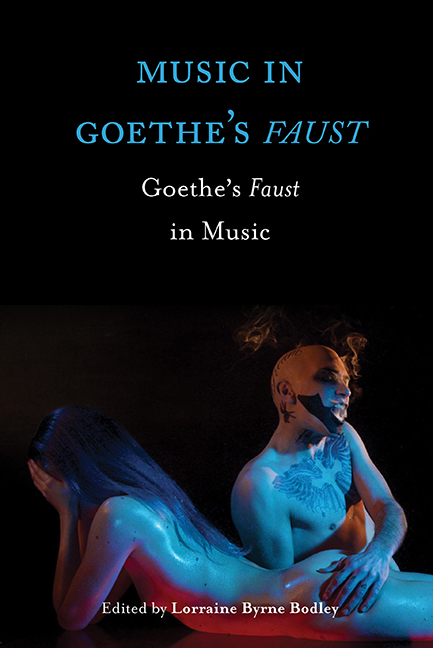Book contents
- Frontmatter
- Dedication
- Contents
- List of Illustrations
- Contributors
- Acknowledgements
- Abbreviations Used in the Notes
- Introduction. Rhapsody and Rebuke: Goethe's Faust in Music
- Part I Goethe's Faust: Content and Context
- Part II Legacies: Goethe's Faust in the Nineteenth Century
- 6 Faust's Schubert: Schubert's Faust
- 7 The Musical Novel as Master-genre: Schumann's Szenen aus Goethes Faust
- 8 The Psychology of Schumann's Faust: Developing the Human Soul
- 9 A Life with Goethe: Wagner's Engagement with Faust in Music and in Words
- 10 Wagner's Ninth: Reading Beethoven with Faust
- 11 Linking Christian and Faustian Utopias: Mahler's Setting of the Schlußszene in his Eighth Symphony
- Part III Topographies: Stagings and Critical Reception
- Part IV New Directions: Recent Productions and Appropriations
- Select Bibliography
- Index
10 - Wagner's Ninth: Reading Beethoven with Faust
from Part II - Legacies: Goethe's Faust in the Nineteenth Century
Published online by Cambridge University Press: 30 August 2017
- Frontmatter
- Dedication
- Contents
- List of Illustrations
- Contributors
- Acknowledgements
- Abbreviations Used in the Notes
- Introduction. Rhapsody and Rebuke: Goethe's Faust in Music
- Part I Goethe's Faust: Content and Context
- Part II Legacies: Goethe's Faust in the Nineteenth Century
- 6 Faust's Schubert: Schubert's Faust
- 7 The Musical Novel as Master-genre: Schumann's Szenen aus Goethes Faust
- 8 The Psychology of Schumann's Faust: Developing the Human Soul
- 9 A Life with Goethe: Wagner's Engagement with Faust in Music and in Words
- 10 Wagner's Ninth: Reading Beethoven with Faust
- 11 Linking Christian and Faustian Utopias: Mahler's Setting of the Schlußszene in his Eighth Symphony
- Part III Topographies: Stagings and Critical Reception
- Part IV New Directions: Recent Productions and Appropriations
- Select Bibliography
- Index
Summary
The expression ‘Wagner's Ninth’ has become commonplace in the reception history of Beethoven's choral symphony. Nicholas Cook devotes an entire section of his Beethoven: Symphony no. 9 to this concept. A contemporary indication of the regard in which Wagner's interpretation was held by performers during much of the late nineteenth and early twentieth centuries is provided by Richard Strauss's handwritten remark at the head of his personal copy of the Eulenburg edition of the score: ‘Alles Wesentliche über diese Symphonie ist von Rich. Wagner’ [Everything significant on this symphony comes from Richard Wagner].
The main textual evidence for the concept of ‘Wagner's Ninth’ is Wagner's essay of 1873, Zum Vortrag der neunten Symphonie Beethovens [The Rendering of Beethoven's Ninth Symphony], which offers detailed advice on the issues facing performers of the work. Wagner's approach involves an attempt to discern the composer's intentions in order to arrive at a musical interpretation that is not only accurate, but faithful to the spirit that inspired the score. Less well known, however, is the programmatic description Wagner produced in 1846 for the benefit of audiences in Dresden hearing the work for the first time. The essay was printed as a programme note without a title; we will refer to it as the Programm. This essay uses quotations from Goethe's Faust in an attempt to provide verbal illustrations of Beethoven's music and reveals the foundations on which ‘Wagner's Ninth’ – his interpretation of Beethoven's work – was built.
It is surprising that the Programm has not received detailed attention. Although there are references to it in many important secondary texts, notably Kropfinger's Wagner and Beethoven, Grey's Wagner's Musical Prose and Dahlhaus's The Idea of Absolute Music, full critical examination of the text itself has been cursory. Grey even describes the Programm as ‘relatively obscure’. This lack of critical interest presumably results from contemporary scholarship's rejection of poetic association as an acceptable methodology for the elucidation of musical works.
- Type
- Chapter
- Information
- Music in Goethe's FaustGoethe's Faust in Music, pp. 172 - 182Publisher: Boydell & BrewerPrint publication year: 2017



